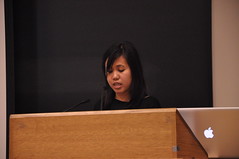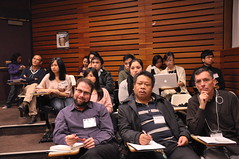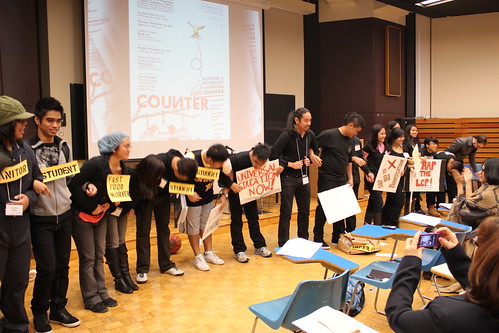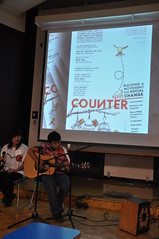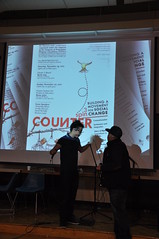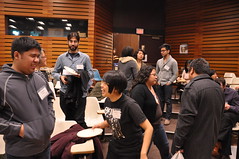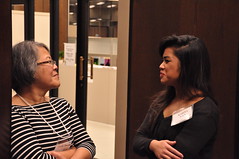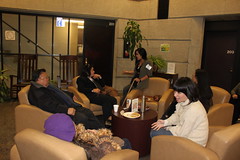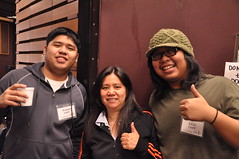Conference Communiqué
December 9, 2011
With over 120 participants, “Counterspin 3: Building a movement for social change” Ontario-wide conference, once again, heightened, with militancy, the pivotal and crucial role of marginalized communities in Canada, such as the Filipino Canadian community, to intensify the building of a genuine progressive movement that will bring about social change in a country that continues to systemically deny communities of colour their full participation and entitlement.
Held at the University of Toronto and the Ontario Institute for Studies in Education on November 19th and the 20th, respectively, “Counterspin 3” is a continuation of the Filipino Canadian community’s assertion to counter their intensifying social and political exclusion as manifested in their struggles against systemic racism, gender oppression, and economic marginalization. Organized by the Magkaisa Centre, and under the auspices of the newly formed Congress of Progressive Filipino Canadians (CPFC), “Counterspin 3” is symbolic of the desire of members of the Filipino Canadian community to create a path towards their just and genuine settlement and integration in Canada.
Launched in Montreal on May 2010, and followed by the conference held in Vancouver in June 2011, the series of “Counterspin” conferences is a testament of the progression in the organizing within the progressive Filipino Canadian community that embraces the working-class perspective as a primary tool to advance socialism and to counter the increasing attacks of neoliberal agenda of globalization perpetuated against the working-class and racialized peoples in Canada. More so, “Counterspin” exemplifies the growing assertion within the community to build a home and a future, nurtured in the culture of resistance and empowerment.


Delegates listen to the first panel
Steeped with enthusiasm and excitement, “Counterspin 3” conference delegates deepened their understanding of the current global politics and progressive movements; the history of Filipino Canadians; and their concrete struggles, challenges and barriers in Canada, including the role of art and cultural resistance; and the importance of understanding social services as part of a community’s full participation and entitlement.
Guest speakers Ninotchka Rosca, Filipina feminist and internationally-renowned novelist; Dr. David McNally, long-time activist and political science professor at York University; and Emmanuel Sayo, community organizer and pioneer in human rights organizing in the Filipino Canadian community, opened the conference with a critical look at the ongoing crisis of neoliberalism, and the desperate measures being taken to maintain the current system of globalization and imperialism at the expense of the world’s working-class. Along with this progressive analysis of global political economy, an emphasis was also put into the roles of resistance movements in unmasking the impending demise and the rapid deterioration of the current economic system of capitalism. The organic growth of various forms of resistance, such as the Occupy Movement, and the resistance coming from progressive migrant and immigrant communities, were reiterated as key components in bringing about genuine social change.
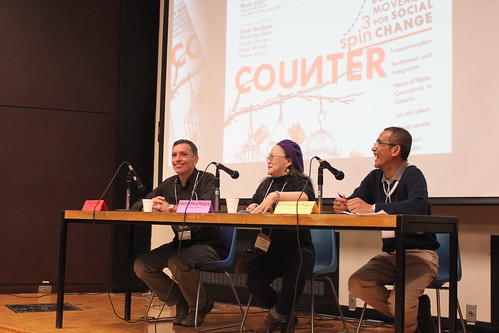
From left to right: Dr. David McNally, Ninotchka Rosca and Emmanuel Sayo
From an engaging discussion and debate on global politics and movement, the succeeding panels presented on the concrete expressions of the Filipino Canadian community’s current reality as a transnational community; its continuing resistance against the community’s increasing exclusion and marginalization; and most importantly, its role in reclaiming the progressive culture and history of a community that, for over 20 years, has been at the forefront of exposing and opposing the systemic violence and aggression perpetuated on Filipino Canadian women, workers, and youth, and other members of the working-class in Canada.
Emphasizing the intensifying blows of the neoliberal agenda that further marginalizes, excludes, and attacks the well-being of the growing Filipino Canadian community, panelists Joy C. Sioson and Reuben Sarumugam of the Magkaisa Centre, presented on the history of Filipino Canadians in Ontario, the making of the progressive Filipino Canadian movement, and the overview of the current conditions of one of the largest ethnic groups in the province, particularly in the City of Toronto. The delegates’ attention was drawn to the direct impacts of official federal and provincial policies that shaped and continuously shape the Filipino community in Canada. They showed that the progressive Filipino Canadian movement has also been and continues to be the driving force in combating the barriers to genuine settlement and integration through community educating, organizing, and mobilizing.
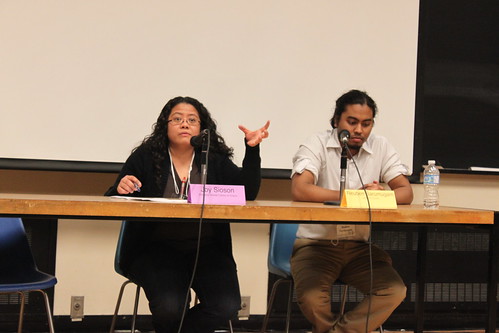
Joy Sioson, chairperson of PWC-ON and Reuben Sarumugam of UKPC/FCYA-ON
Reclaiming their roles as part of the leading force in making history and challenging the market-driven economic and social policies that perpetuate their marginalization, sectoral representatives Bryan Taguba of SIKLAB, Qara Clemente of PWC, and Ken Santos and Aila Comilang of UKPC/FCYA, posed the challenge to all Filipino Canadian workers, women and youth to cultivate a culture that will develop an empowered community, immersed in the knowledge and practice of the importance of sharpening the tools and taking the revolutionary road, towards genuine liberation, equality, and human rights for future generations. The speakers also acknowledged that the path paved by those who pioneered the organizing of progressive Filipino Canadians serves as a continuing inspiration for them to lead the future of the community.
As the new wave of community organizing in the Filipino Canadian community grows, progressive music, art and poetry depicting realities and common struggles become important tools in educating, and popularizing the creative nature of the community. Marissa Largo, Toronto-based artist and educator; Jean Marc Daga, spoken word artist and SIKLAB-ON member; and Neil Castro, Sinag Bayan founder and chairperson of the National Council of the Filipino Canadian Youth Alliance, elaborated on the arts and the cultural arena as an essential component in shaping and transforming art and culture as one that inspires collective action towards social change.
As an illustration of the creativity and talent within the Filipino Canadian community, various performances by Sinag Bayan Ontario took centre stage to depict the true force of the community’s culture of resistance. In “My Folks,” a combination of spoken word poetry and striking live gestures, performers conveyed the resiliency and militancy of the Filipino Canadian community to confront the systemic forces that relegate its members into exploitation and marginalization. In “Kapit Bisig Maleta Fashion Show,” various stories of migration were depicted by painted maletas (suitcases) bearing the portraits of community members as live-in caregivers, mail order brides, service sector workers, youth and the elderly, each embodied by their respective performers. Both pieces represented an all-out assertion that the Filipino Canadian community will continue to strengthen its resolve in their struggle for genuine settlement, full participation, and entitlement in the broader Canadian society.
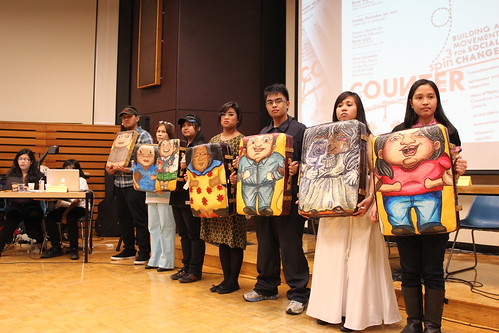
Kapit Bisig Maleta fashion show
Tying the Filipino Canadian community’s struggle for a just and genuine settlement and integration with understanding and accessing social services in Canada, the last panel examined the role of social services from the perspective of the Filipino Canadian community. Ilyan Ferrer, PhD student at McGill University and member of Kabataang Montreal; Danielle Bisnar, lawyer and PWC-ON member; and Cecilia Diocson, founder of the Philippine Women Centre, Executive Director of the National Alliance of Philippine Women in Canada and CPFC, examined the history of social services, the barriers faced by the community in accessing adequate services, and the impacts of the extensive cutbacks and privatization of social and public services on marginalized and racialized communities. All three speakers also highlighted the important task of building the Filipino Canadian community’s capacity to understand the democratic and public provision of social services as vital for a successful and fully developed community and society.
The creative and artistic fervor of various members of Sinag Bayan Ontario, Sinag Bayan Quebec and guest performers ended the day with a much-enjoyed cultural solidarity night. Through songs, poems and dance, conference participants and organizers alike, celebrated the great success of the day’s proceedings with performances that expressed the vision of a truly empowered and liberated Filipino Canadian community.
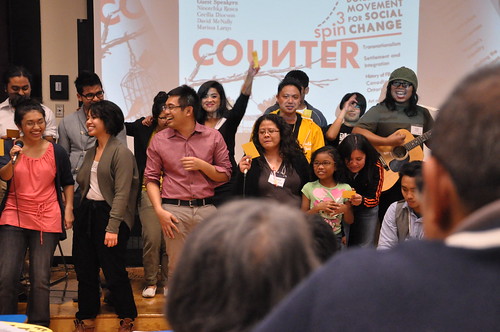
Jean-Marc Daga, Neil Castro and Marissa Largo
The second day of “Counterspin 3” conference was a more intimate sharing and discussion on the 15 major concerns in the Filipino Canadian community. The 15 Concerns serves as the program of action that aims to address working-class issues, and to help advance the struggle for socialism in Canada. A brief study on the history of women’s oppression was also given by Ms. Rosca to further solidify and frame the importance of putting the struggle of women at the very core of the struggle for genuine liberation of the working-class.
-30-
For more information, contact the Conference Secretariat:
Bryan Taguba
(416) 519-2553
pwc-on@magkaisacentre.org
www.magkaisacentre.org
Twitter: #Counterspin3
